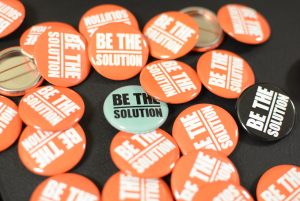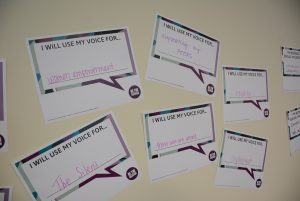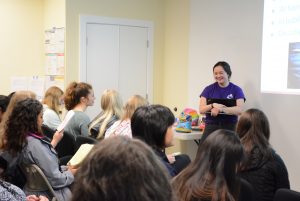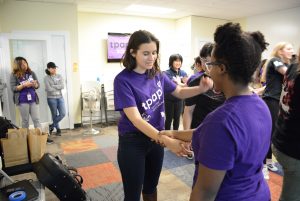AAPI Young Women Rock the House at ACRS Eastside Office
By Andria Keirn, Americorps Employment and Self Sufficiency Aide
Earlier this month, shouts from a room tucked away in our new offices in Bellevue’s Lake Hills neighborhood echoed through the halls. “Leave me alone!” and “no means no,” and muffled sounds of punches and kicks against something solid could be heard from the reception area.
No need to be alarmed — these sounds were part of a women’s self-defense workshop during our Teen Peer Advocacy program’s (TPAP) annual Sexual Assault Awareness and Prevention Fair. Young women lined up as instructors from Seven Stars Kung Fu taught them basic self-defense moves like how to escape a choke hold, and to always aim for the knees, eyes or throat if your life depended on it. “Your most important weapon is your voice,” one instructor said, right before the room erupted in assertive shouts.
TPAP is an all female, youth-led group of high school-aged young women that empowers and educates Asian American and Pacific Islander (AAPI) teens about healthy relationships, sexual assault, dating violence and rape prevention.
Before the self-defense workshop, the girls discussed some stark statistics like “women end up in the hospital for dating abuse more than car accidents, mugging and rape combined.” In small groups, they asked each other, “what does consent mean to you?,” and talked about ways to recognize and get out of an unhealthy relationship.
A large part of what makes TPAP unique is its focus on culture. Dating is a challenge for many of us, but for young AAPI women with immigrant parents in particular, dating can be an exercise in frustration and even personal danger. Young AAPI women are expected to adhere to cultural norms that don’t resonate with them, deal with problems that their parents don’t relate to and function within institutions that systemically oppress them.
“My mother always told me that a good wife is someone who listens to her husband, handles all the chores and never starts fights,” says Jasmine, a young women from Hong Kong. Needless to say, it didn’t go over well when her mom found out that she had a girlfriend. After her long-time secret surfaced, her mother told Jasmine that she’d rather have her date no one at all than to date a girl, advised her to buy a dog for company, and said that she could never tell her father.
TPAP emphasizes the importance of partner equality in a relationship, and helps participants recognize the negative impacts that inherited gender roles have on young women and men. “TPAP shows us what healthy relationships are supposed to look like,” says TPAP graduate Jenna. If youth emulate and reinforce the behavior of generations before them, it would continue to put men in positions power and women in the back seat; they would contribute to a cycle of female oppression and unfair power dynamics that could lead to abuse. Up to 61 % of AAPI women report being physically or sexually abused in their lifetimes, according to a study by the Asian Pacific Institute on Gender Based Violence.
We must all be aware of the ways that women continue to be unjustly portrayed and treated in our society. It is unacceptable for someone in the highest elected office in our country to make jokes about grabbing women’s genitalia, and for the conversation to be focused on the potential hardships a young man accused (or convicted) of sexual assault may experience in life rather than on his victim’s life and well-being.
TPAP’s work is especially important because sexual assault and how to have healthy relationships are topics that are largely unaddressed in our public schools. “We have generic health classes at school that don’t cover this stuff. They’re not attuned to us, and they don’t make you feel comfortable,” says one TPAP member. “This is a safe space to have fun and open up.”
TPAP demonstrates that young women have the power to effect change. At ACRS, TPAP participants have a platform to discover their voices, recognize their tremendous worth and strengthen our communities through their own empowerment.
Disclaimer : Names in this article have been changed to protect identity.










